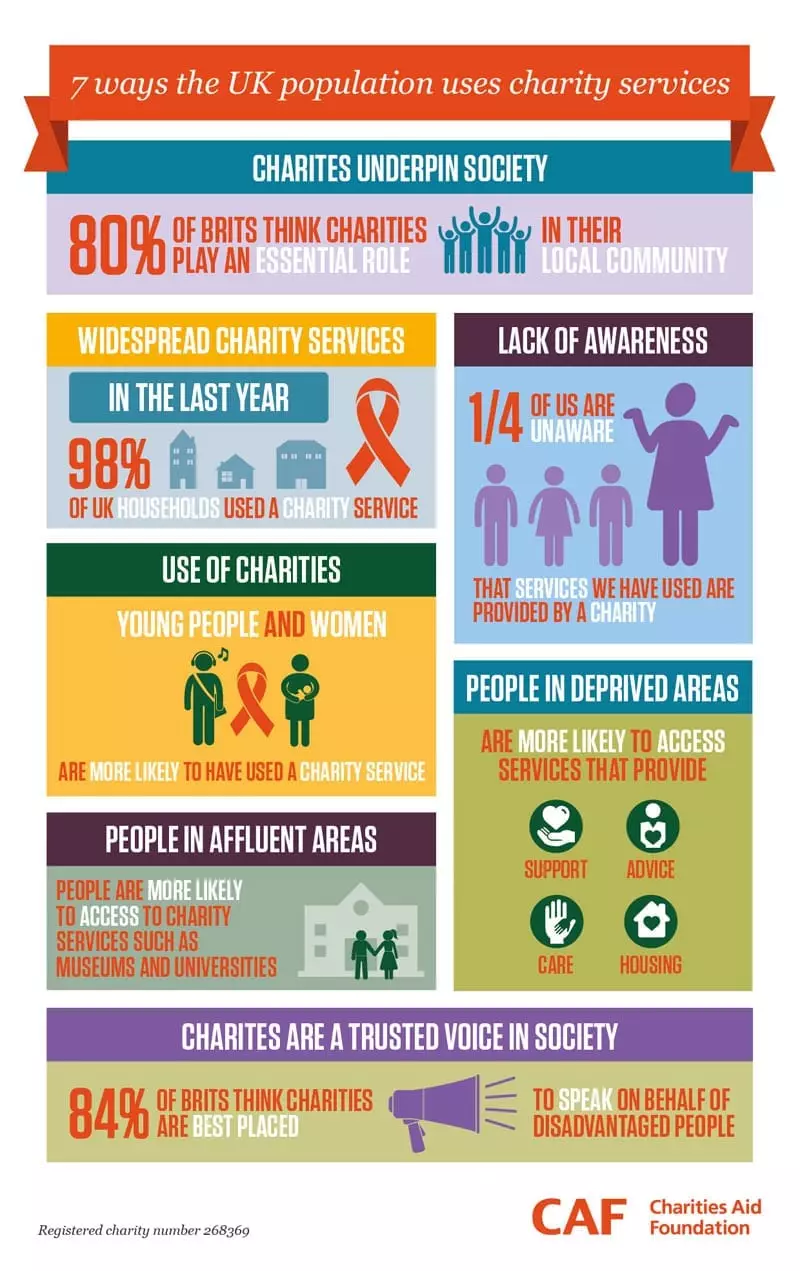CAF Charity Street II reveals rising public use of charities
Charity use is widespread and on the rise in the UK with 98% of households having used a charity at some point, and four out of five (83%) have used a charity service in the last 12 months, according to the Charities Aid Foundation (CAF).
This is an increase from 2014, when 79% had used a charity in the last 12 months, and 93% said they had at some point used a charity.
Published this month, Charity Street II: the value of charity to British households, updates CAF’s 2014 Charity Street, and is based on a survey that ran between 19th and 21st February 2016 as part of Populus’s online omnibus, collecting 2,054 responses from the UK public.
It looks at the way households and individuals use charitable services and whether or not individuals are aware these are charitable services, and uncovers differences between gender, age groups and, for the first time, the type of area in which people live.
[youtube height=”450″width=”800″]https://www.youtube.com/watch?v=bKOIYWTZ0zE[/youtube]
Key findings:
- Those in the least deprived areas of the UK access a larger number of charitable services – those in the least deprived areas in the UK have accessed on average 6.24 services compared to 5.60 services for those in the most deprived areas. Services accessed differ, with those in the least deprived areas accessing charitable services provided for entertainment or education (such as museums and universities) compared to those in the most deprived areas. Conversely, those in the most deprived areas are more likely to access services that provide support, advice, care or housing.
- Young people and women are more likely to have personally used a charity service – 18-24 year olds are more likely to have personally used a service provided by a charitable organisation in the last month (60% vs. 50% overall) and women are more likely to have used a service in the last month than men (54% vs. 44%).
- Charities are seen to provide a wide range of benefits to people – the most common benefit reported from using a charity service was providing an enjoyable/fun experience (22%, up from 13% in 2014). The second biggest benefit was receiving emotional support or counselling from a charity service (20%, up from 14% in 2014).
- Charity or not a charity? – The research found that almost a quarter (23%) were unaware that the services that they or someone in their household had used were run by charities.
- There is a lack of charitable awareness – only 8% of those interviewed were aware that all of the services that were included in the research were run by charities prior to taking part in the survey.
- Charities underpin society – people believe that charities play an essential / very important role in society in general (92%), as well as in the area in which they live (80%). More than 2 in 5 (43%) feel that charities play an essential or very important role in their lives and those of their household.
- Charities are best placed and most trusted to speak on behalf of the disadvantaged – 84% felt that charities were best placed to speak on behalf of disadvantaged people and 76% said they most trusted charities to do this. This is significantly higher than for politicians where 27% felt MPs were best placed and just 3% said they would trust them most to speak on behalf of disadvantaged people.
The full report can be accessed on the CAF site: www.cafonline.org/docs/default-source/about-us-publications/160704_caf_charity_street_report_web.pdf
Advertisement





